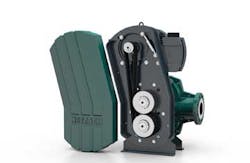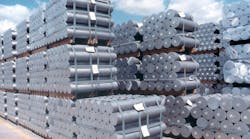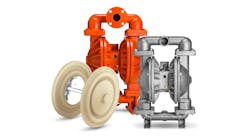A recently developed rotary lobe pump addresses conveying challenges encountered during the production of highly abrasive bonding primer at Knauf Bauproducte Iphofen of Iphofen, Germany. Following six months of operation, the pump has delivered four times the service life typically achieved by other pumps used for the application.
Knauf Iphofen is a global supplier of materials for construction, building and interiors.
The concrete primer, when used in building construction, ensures even bonding of plaster onto smooth walls. At the Knauf Iphofen production plant, however, it presents conveyance challenges. The primer is a dispersion and has a mineral solid content of around 60%. That makes moving the primer somewhat like putting emery paper through a pump.
The Tornado T2 from Netzsch Pumpen & Systeme GmbH of Waldkraiburg, Germany, has been in use at Knauf Iphofen since April 2012 and has been commercially available in the United States since October 2012. It successfully addresses the conveyance challenge at Knauf Iphofen because of its several important innovations in rotary lobe pump design, Netzsch says. These include use of hardened-steel lobes running inside an elastomer-lined metal housing and a timing tooth belt to both synchronize and drive the pump’s rotating element.
A Tornado T2 at Knauf Iphofen’s concrete-primer filling station is used for loading and unloading the storage tank, including into large barrels for shipping. Operation is intermittent; the pump is started up and shut down for each filling process, including five seconds of warm-up followed by 20 seconds of operation. These frequent start-stop intervals, two per minute or 80,000 a month, are said to be a real killer for most pumps.
Well-known pump technology
Rotary lobe pumps routinely handle solids, slurries, pastes and many liquids. They deliver a gentle pumping action that minimizes product degradation and find many industrial uses due to good sanitary qualities, corrosion resistance and clean-in-place and steam-in-place characteristics.
Previously, a "conventional" rotary lobe pump used at Knauf Iphofen was able to convey about 600 tons of abrasive primer before the rotary lobes and wear plates were so badly affected that the specified pumping capacity couldn’t be maintained.
Accomplishing required production throughput necessitated a considerable maintenance effort. "At busy times we were repairing the pump every three to four weeks," says Maintenance Manager Armin Ryba.
Each time the pump was repaired, rotary lobes and wear plates had to be replaced. Every second repair, maintenance personnel replaced the shaft seal. This was reason enough to search for an alternative, Ryba says.
A rotary lobe pump of Netzsch’s Tornado T2 generation, the TORNADO T.Proc 08/45 BD-E, was installed at Knauf Iphofen in April 2012.
Development parameters
Engineered for challenges of the kind encountered at Knauf Iphofen, the Tornado T2 generation of rotary lobe pumps "reverses the entire materials concept of conventional rotary lobe pumps," says Thomas Streubel, president, Netzsch Pumps North America.
As stated, instead of standard elastomer lobes, the Tornado T2 incorporates metal lobes running inside an elastomer-lined metal housing. The elastomer insert vulcanized onto the flanks of the lobes creates a permanent "hard-soft" contact between the lobes throughout the 360-degree rotation cycle. This precludes high-wear contact between elastomer or metal parts.
The bi-lobe rotor design delivers a "considerably longer" sealing line to the housing, for more wear padding. The elastomer insert acts as a stator and is subject to considerably less dynamic load and deformation than a traditional rotary lobe pump design, where the elastomer is used as rotor material.
"This is very different than a traditional rotary lobe pump," Streubel says. "There, a steel housing and two rubber lobes are used, which creates complications relating to the optimal dimensional fit between rubber-on-rubber or rubber-on-steel parts. With the Tornado T2, in every position, contact is always steel-on-rubber, for better interference fits, efficient operation and longer maintenance life."
Eliminating contact of similar materials in the static and dynamic pump head components and using elastomers as stationary components — and therefore subjected to less dynamic load — results in less plastic deformation and stress. Ultimately, energy is saved, wear is reduced and the pump’s overall service life is increased.
"Contact is always soft against hard, not hard against hard or soft against soft," Streubel says.
Synchronized gear with belt drive
Additionally, the pump drive is radically modified. Complex timing gear is replaced by a robust synchronized gear with belt drive. The danger of transmission damage is greatly reduced, even as weight and required installation space are decreased.
By this incorporation of a timing tooth belt to both synchronize and drive the rotating element of the Tornado T2, a smaller footprint is achieved; the gearbox, and the oil required to run it, is eliminated.
Because the drive requires no lubrication, the possibility of chance oil leaks is eliminated. Typical repairs and periodic maintenance are simplified because the conveying and gear chambers are easily opened. The cover and component attachments are easily accessible and any component can be replaced using standard, commercial tools in just minutes.
Benefits include improved performance of rotors, elastomer liners and mechanical seals. With its modular design, the T2 is easier and less costly to maintain.
Finally, a specially developed pulsation-reduction system ensures minimal pulsation or shear forces are generated, despite this straight, bi-lobe rotor design.
More work, much less maintenance
Knauf inspected the bonding primer pump after moving 1,200 tons of material. Surprisingly enough, the very first inspection of the Tornado T2 demonstrated the solution’s value.
Cover and elastomer inserts were easily disassembled. Conveying elements were easily disassembled and removed. In comparison to the rotary lobe pump previously used, significantly less wear was found, even following double the in-service period. Cover and housing inserts showed only minor leaching and were still usable. The edges of the lobe inserts were hardly worn. There was, however, a little grooving in the front end.
Belt-drive inspection revealed no wear on the double-toothed belt or belt pulley. Belt tension was only slightly reduced and not in any way critical to the condition on delivery — in spite of demanding, non-continuous operation, with about 60,000 load changes since commissioning.
When the inspection was made, the Tornado T2 pump had already delivered double the volume the previous pump could deliver without maintenance, and reached only 60% of maximum speed. "So we still have a lot more potential," says Dirk Schmalz, Netzsch product line manager. "Based on the operating time so far, the Tornado T2 can certainly achieve three times the service life."
This was confirmed after six month’s operation: with three to four times the conveyance there has been more than four times the service life.
Knauf Iphofen is very satisfied with the rotary lobe pump. Looking at the dollars and cents, Ryba concludes, "The long service life means that we incur less costs for spare parts, repairs and downtimes."
NETZSCH, founded in 1873, is a diversified manufacturer of specialized industrial equipment with solutions for a broad range of demanding industries. For 60 years, NETZSCH Pumpen & Systeme GmbH has served markets worldwide with its NEMO® progressing cavity pumps, TORNADO® rotary lobe pumps, grinding machines, dosing systems and accessories, providing customized, sophisticated solutions for applications in every type of industry. NETZSCH Pumps North America, Exton, Pa. is a manufacturer of progressing cavity and rotary lobe pumps, as well as grinding and dispersing equipment.


